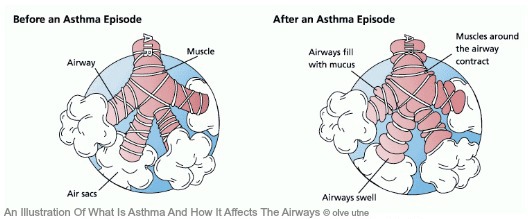What Is Asthma?
Find Ways To Manage And Treat It So It Affects Your Life Less
So, what is asthma, and how can you best manage it so it doesn’t have an adverse affect on your life.
Asthma is a very common, and potentially dangerous, condition that affects your airways.
Its causes inflammation of the airways, as well as increasing the production of mucus (phlegm).
Asthma is triggered by allergens that irritate your lungs. It is what causes the reaction that narrows your airways making it harder for the air to pass through.
This is what makes it more difficult for an asthma sufferer to breathe. And what brings about your asthma symptoms.

Asthma Symptoms
The main symptoms associated with asthma include
- Coughing. This can be worse at night or in the morning
- Wheezing. It can sound like a whistling noise
- Breathlessness. You may struggle to catch your breathe
- Tightness in the chest
If you are concerned you may have asthma then visit your doctor. Asthma can be a serious condition, so getting it diagnosed as quickly as possible is very important.
Diagnosing Asthma
The first thing your doctor will do is look at your symptoms. Sometimes this enough to make a diagnosis.
If your doctor is unsure then there are 2 tests that can be done
Spirometry
This test involves you blowing into a spirometer. It helps to see how well your lungs are working.
The spirometer takes two measurements
- the amount of air you can blow out in one second
- the amount of air you
can blow out in one breath
The measurements are
compared to the average measurements for your age.
If you have a low
reading it means that you have narrow airways. The cause of asthma.
To make sure that the diagnosis is asthma, you may be given a reliever inhaler to use. You would use it, and then be tested again.
If your measurements were higher it would show that the medication had worked and you are more than likely have asthma.
Peak Flow Test
This is used to measure how fast you can blow all the air out from your lungs.
To do this a peak flow
meter is used.
If your peak flow reading is low, so slower, compared to the expected reading for your age, then your airways will likely be narrow.
Again, as for the
spirometry test, this is a good indication that you have asthma.
You may be given a
meter to take home for a couple of weeks. You can keep a diary of
your readings, and any asthma symptoms you are experiencing.
This will help to recognise when your symptoms are getting worse. And also help to figure out how well a treatment is working.
There are other tests available if a diagnosis is still unsure. For most people that is unnecessary.
Once your diagnosis is certain, you can start looking into what triggers your symptoms.
What Is Asthma's Triggers?
Everyone has different triggers which could bring about their symptoms. These will irritate your lungs and start the allergic reaction that causes your airways to narrow. And your symptoms to appear.
The most common triggers are
- Pollen
- House dust mites
- Pet dander
- Cigarette smoke
- Chemical fumes
- Weather
- Mould
- Damp
- Food allergies
If you know what your triggers are you can avoid them as much as possible. Its hard to eliminate them totally. Whichever ones are problematic, you can make your environment as asthma friendly as possible.
What Causes Asthma?
There is no definite answer to what causes asthma. Its not known why one person is a sufferer, while another is not.
There are some reasons
to why you may of developed it
- A family history of
atopic diseases. If one or both of your parents suffer from one or
more atopic condition there is a higher risk that you will be a
sufferer
- If your mother smoked
during her pregnancy. Also if you were exposed to smoke as a child
- Having a childhood pet.
Cats and horses seem to be more of an issue
- If you were born
prematurely
- If you had infections
in childhood
People of any age can
develop asthma. It is common for it to start in childhood. Around 1
in 10 children have asthma. Though half of those children do grow out
of it.
It can develop in adults. Around 1 in 20 adults have asthma. If you grow out of it as a child there is still a chance that it may return.
Treating Asthma
Although there is no cure for asthma, there are many ways to manage your condition.
This can be done using
Self Care
This is an important part of managing your asthma. It will help you to reduce the risk of an asthma attack. Preventing the symptoms from getting worse.
There are a number of things you can do
- Avoid any triggers that
make your symptoms worse
- Take your medication
correctly. Use the right type, at the right time and the right dosage
- Have regular check ups
with your doctor or specialist. This helps to make sure that your
asthma is being as well managed as it can
- If you don’t smoke,
great. If you do then now is the time to quit, whether it is you or
your child who has asthma. Passive smoking is no good for an asthma
sufferer
- Keep healthy. You need
to protect yourself from infections. Especially chest infections and
the flu. You can speak to your doctor about getting a flu jab
- Take some exercise.
Some asthma can be aggravated by exercise, but exercise is good for
the condition. If you have problems with symptoms occurring while
exercise your doctor may advise you to use a reliever inhaler. Always
speak to your doctor about the best way to exercise so your asthma
isn’t negatively affected
If you start getting severe symptoms always contact your doctor or your specialist, or call the emergency services
Asthma Medications
Medications are used to control and manage your asthma.
The treatments used are
Personal Action Plan
This is a written plan. You would normally complete it with your doctor and specialist.
The plan contains
- details on which asthma medication you are taking
- how to notice when your symptoms are getting worse
- what to do if you have an asthma attack
It is normally
completed when you visit your doctor after you have been diagnosed.
If you are ever
admitted to hospital because of a severe attack you will also
complete a plan. Or review your current one.
Your plan will be reviewed at least once a year. Though if your asthma gets worse it will be looked at again, and changes made if needed.
Inhalers
These are the most commonly used asthma treatment.
They are used to get
medication straight to the inflamed airways. It is a very effective
way of treating the symptoms of asthma.
Some people have
trouble using inhalers. This can be combated by using a spacer.
A spacer is a plastic container. It has a mouthpiece at one end. At the other end is a hole where your inhaler would fit. The drug is released from your inhaler into the plastic container. You then slowly breathe in the drug through the mouthpiece.

Your doctor will show you how to use your inhaler and spacer properly.
With a spacer you can use any of the following inhalers.
Reliever Inhaler
These are used as and when you need them. As the name suggests they will relieve your symptoms.
They work quickly, by
relaxing the muscles around the airways. This helps to widen them, so
you can breathe easier.
It is rare to have any
side effects to this type of treatment. So they are ideal to use
regularly. Though if you need to use it more than 3 times a week you
may need to start using a preventer inhaler.
However severe your asthma is you would always be given a reliever inhaler as part of your treatment.
You will recognise it as it is usually blue in colour.
Preventer Inhaler
This type of inhaler doesn’t work straight away. It works over time to reduce the inflammation of the airways. They help to prevent any symptoms occurring.
A preventer inhaler
needs to be used daily. It can take 7-14 days to be effective. So
daily use is important for building up the protective effect of the
drug.
You will start on a
dosage that controls your symptoms. When they have improved you will
receive the lowest effective dose.
You can still use your
reliever inhaler if you need it. Though the drug in the preventer
inhaler should reduce the amount of asthma attacks that you have.
Preventer inhalers are usually brown, orange or red.
Long Acting Inhaler
This type of inhaler is used alongside a preventer inhaler. It should not be used on it's own. It has been reported that using just a long acting inhaler could increase your risk of an asthma attack.
A long acting inhaler
maybe given if your symptoms don’t improve after using the other
types of inhalers.
They work similar to a
reliever inhaler. Though they are not quite as quick to work. But
they are effective for up to 12 hours.
If using these inhalers
does not help to ease your asthma you maybe prescribed either
- Oral Steroids, or
- Omalizumab
Oral Steroids
These are usually given as a short term solution. Normally between 1-2 weeks.
They can help with a
severe asthma attack. They reduce the inflammation in the airways.
Once your symptoms are
manageable again you would go back to using just your regular
treatment.
There are worries about the side effects of oral steroids. If they are taken correctly and for a short time, any potential side effects are rare.
Omalizumab
It's trade name is Xolair.
It would only usually be given if you have persistent, severe asthma. Normally if it cant be managed by other treatments.
It helps reduce
inflammation by affecting the immune system.
The treatment would be
injected into the body. It is given every few weeks in a specialist
asthma centre. If it is not effective after 16 weeks treatment is
stopped.
By using preventative measures and taking the right medications most people would be able to manage and control their asthma so it doesn’t have too much of a negative impact on their life.
Asthma can have a massive effect on someone's life, and on the people around them.
If you have severe
asthma it can affect your whole life. It can be life threatening. It is a serious condition.
I have given you an overview of what is asthma. But always get, and follow, medical advice about any aspect of the condition. This will help you to help yourself, or your child, limit the effect it has on your life.
Return From What Is Asthma to Atopic Disease
Return From What Is Asthma to What Is Eczema
Search What Is Eczema?
Advertising on What Is Eczema?
We are a participant in the Amazon Services LLC Associates Program, an affiliate program which allows sites to earn fees by advertising and linking to amazon.com. If you make a purchase through a link on this page, I may receive a small commission, at no extra cost to you. Many thanks
